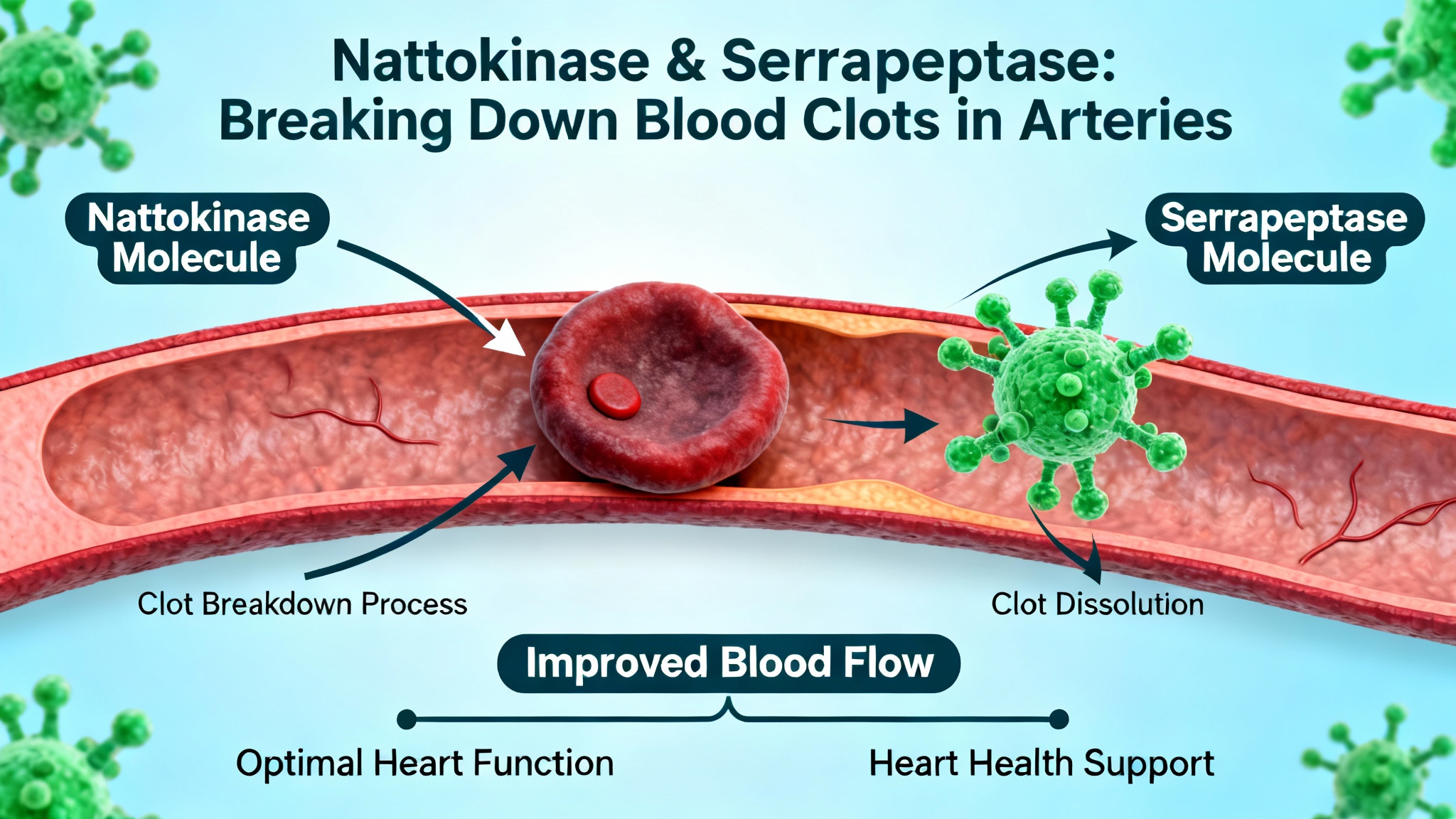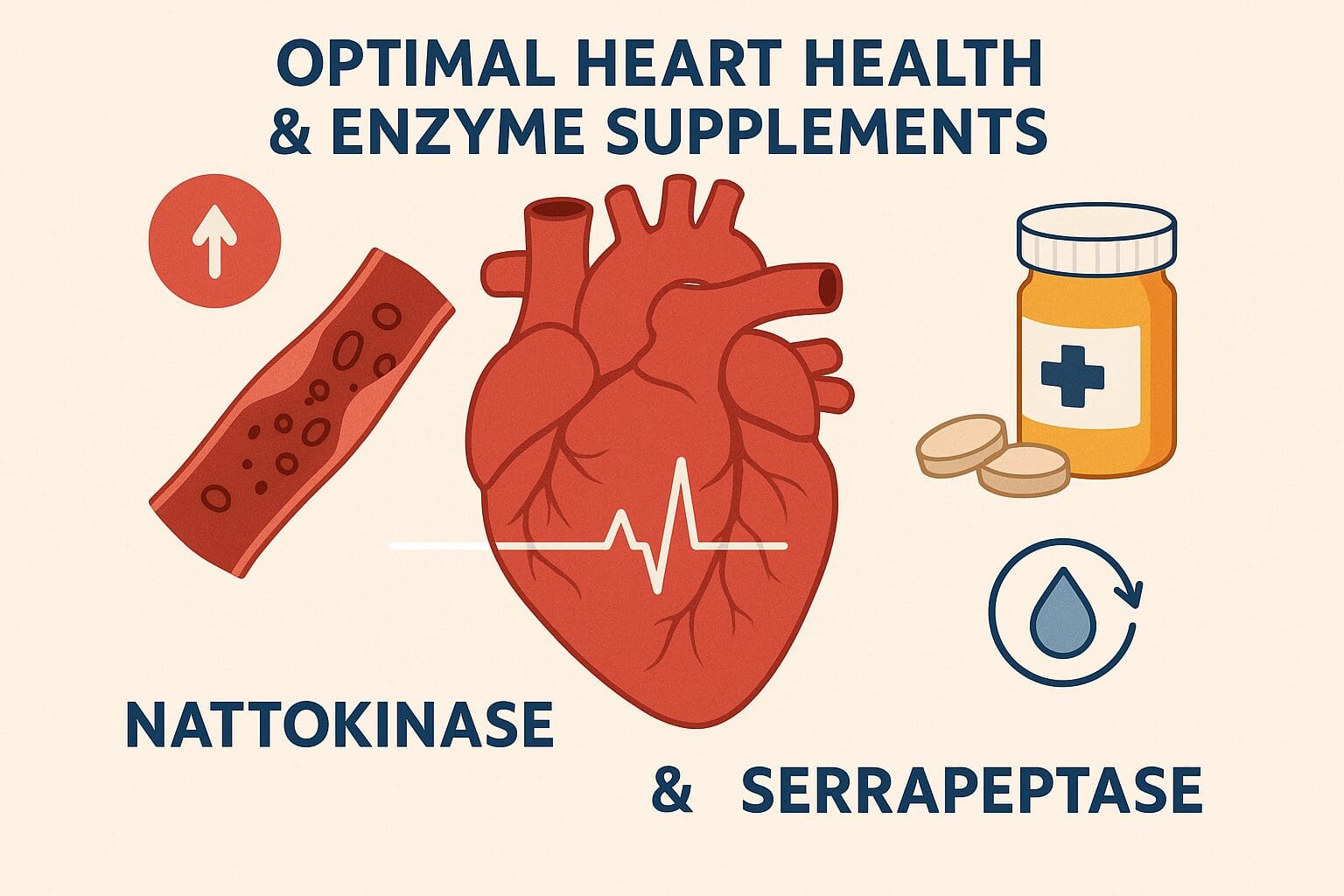Introduction
Maintaining heart health and striving for an optimal heart are essential goals for anyone aiming to prevent heart disease. Enzyme supplements like nattokinase and serrapeptase have gained attention for their potential to improve heart health by supporting fibrinolysis, the body’s natural process for breaking down blood clots. This article reviews the evidence, dosing considerations, safety, and interactions for these popular supplements and examines how they may contribute to optimal heart outcomes, particularly in the context of clotting and circulation. Read on to learn how nattokinase and serrapeptase intersect with cardiovascular wellness and whether they’re right for you.
What is Review evidence, dosing considerations, safety, and interactions for enzyme supplements targeting clotting and circulation.?
Nattokinase is a fibrinolytic enzyme derived from natto, a traditional Japanese food made by fermenting soybeans with Bacillus subtilis. Serrapeptase, also known as serratiopeptidase, is an enzyme produced by the digestive tract of silkworms and commonly used in supplements. Both are believed to support heart health by breaking down fibrin, a protein involved in clot formation, thus aiding circulation and reducing unwanted blood clot risks Sumi et al., 1987; Moriya et al., 2020.
Benefits and Outcomes in Heart Disease
Research suggests that nattokinase and serrapeptase may have several benefits for cardiovascular health. By enhancing fibrinolysis, both enzymes help dissolve fibrin networks in blood clots, potentially lowering the risk of heart attack and stroke. Studies have demonstrated nattokinase’s ability to reduce blood pressure and promote healthy blood flow, improving overall heart health Hsia et al., 2009. Serrapeptase may reduce arterial plaque and support the breakdown of non-living tissue, aiding optimal heart maintenance Majima et al., 2018. Inflammation modulation by these enzymes further supports cardiovascular outcomes, improving vessel flexibility and circulation Ghosh et al., 2019.

Research Insights
Numerous clinical studies have explored the effects of fibrinolytic enzymes on heart disease outcomes. A randomized, controlled study found that nattokinase supplementation lowered both systolic and diastolic blood pressure in adults with prehypertension Hsia et al., 2009. Another systematic review concluded that nattokinase has a positive effect on blood lipid profiles and clot resolution without significant side effects Moriyama, 2019. Serrapeptase has shown anti-inflammatory and anti-edematous benefits, potentially reducing arterial stiffness—a risk factor for heart disease Ghosh et al., 2019. However, more robust, large-scale human trials are needed to solidify these findings.
Practical Applications
In practice, nattokinase and serrapeptase are taken as oral supplements, often in enteric-coated capsules to protect enzymes from stomach acid. Dosing varies, but clinical studies commonly use 2,000 FU (fibrinolytic units) of nattokinase daily, and serrapeptase doses range from 10–60 mg daily Moriyama, 2019. Those who may benefit most include individuals at risk of cardiovascular events, people with a history of blood clots, or those looking for natural ways to support heart health and an optimal heart. Always consult a healthcare provider before starting any supplement to discuss suitability, particularly for those on blood thinners or managing chronic health conditions.
Risks & Limitations
While nattokinase and serrapeptase are considered safe for most adults, there are important cautions. Both enzymes have blood-thinning effects and may increase bleeding risk, especially in people taking anticoagulant or antiplatelet medications Kurosawa et al., 2005. Research is still emerging, and most studies are short-term, with limited data on long-term safety. Pregnant women, children, and those with bleeding disorders should avoid these supplements unless directed by a physician. Quality control for enzyme supplements varies, so choose products from reputable manufacturers Moriyama, 2019.
Key Takeaways
- Nattokinase and serrapeptase support heart health by improving fibrinolysis and circulation, aiding an optimal heart.
- Clinical studies suggest benefits for blood pressure, clot resolution, and inflammation reduction.
- Supplementation should be approached cautiously, particularly for those on blood thinners.
- Most pronounced benefits are seen in adults at increased risk of cardiovascular events.
- Consult a healthcare provider before starting these supplements for individualized guidance.
Frequently Asked Questions
Q1: Can nattokinase and serrapeptase lower heart disease risk?
A: Some human studies indicate that nattokinase and serrapeptase may reduce risk factors like blood clots and high blood pressure, supporting optimal heart outcomes Hsia et al., 2009.
Q2: Are these enzyme supplements safe with other heart medications?
A: Both may interact with blood thinners or antiplatelets and increase bleeding risk, so always consult a healthcare professional before combining them Kurosawa et al., 2005.
Q3: What is a typical dose for improving heart health?
A: Most studies use about 2,000 FU of nattokinase or 10–60 mg of serrapeptase daily, but always follow product guidance and professional advice Moriyama, 2019.
Suggested Links
- American Heart Association – Heart Supplements
- NIH Office of Dietary Supplements – Enzyme Supplements
- PubMed – Latest Research on Fibrinolytic Enzymes
Conclusion
Nattokinase and serrapeptase offer intriguing possibilities for supporting heart health and achieving an optimal heart through their effects on circulation and fibrinolysis. While early evidence and some clinical trials indicate benefits for blood pressure, clot prevention, and inflammation, long-term research is needed. Prioritizing a conversation with your healthcare provider before adding these supplements will ensure you optimize your cardiovascular wellness safely and effectively.



